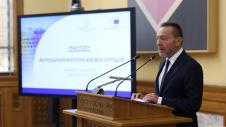Greece seemed for many years the problem case of Europe. Now not any more? Why do we not hear any negative news from Greece any more?
Greece has made very substantial progress since 2010 towards reducing its twin deficits (fiscal and balance of payments), improving competitiveness through structural reforms and recapitalising its banking system. These results had been reflected in all relevant market indicators such as bond yield spreads and banks’ liquidity, in the last several months before the eruption of the coronavirus crisis. This period witnessed an acceleration of structural reforms by the new government which was elected last summer. More recently, the government has been fighting successfully the pandemic, taking bold measures to contain the spread of the virus, as well as the flare-up of the refugee crisis, taking all necessary actions to protect Greece’s borders and the borders of the European Union. This positive news seems to have improved significantly the international sentiment towards Greece.
During these times, governments in many countries are increasing deficit and debt. Will Greece be able to do the same without running into new trouble?
There is no doubt that the coronavirus pandemic will produce, temporarily, higher public deficits and debts, mainly as a result of the lockdown that has been imposed to prevent, as much as possible, the loss of human life. The speed of the recovery after the lockdown, the acceleration of structural reforms which will support growth, and the degree of common action taken by euro area Member States, which, ideally, should be commensurate with that of the ECB, will determine whether the pandemic will have a temporary or a more permanent negative effect on the public finances of the more vulnerable, in terms of public debt, Member States of the euro area, including Greece.
During 2019, Greek government bonds have been a success story on the financial market, because they acquired considerable value. Has this success story come to an end?
It is my belief that the 2019 bond market success story will continue. My answer to the previous question applies here as well. The relatively (compared to other countries) successful, up to now, fighting of the pandemic and the successful management of the refugee flare-up showed that a rational, decisive and disciplined government which follows the advice of experts can inspire people and generate optimism. The same model could be applied in the governance of the economy after the lockdown.
Greece has not yet a status of investment grade from rating agencies. But on the other hand, other countries have been downgraded, while Greece up to now lost only the “positive outlook”. Meanwhile, the ECB has temporarily loosened the barrier between investment grade and risky investments. Is Greece relatively better off now?
The ECB’s decision to grant a “pandemic” waiver to Greece was fully justified since Greece is in an enhanced post-programme surveillance framework, which includes strict targets for primary surpluses and gross financing needs, as well as structural reform targets. In addition, Greece has achieved very substantial economic adjustment, while it has also regained, for quite some time now, market access, and has a considerable cash buffer. ECB decisions since the beginning of the pandemic have been very helpful in preventing fragmentation in the euro area, but this is not enough: timely efforts by euro area governments to prepare and support the recovery are also needed, while the agreement reached at the European Council to work towards establishing a Recovery Fund dedicated to dealing with the pandemic and its aftermath is a necessary and welcome development.
How do you evaluate exogenous risks for Greece and risks stemming from mistakes in domestic economic policies that try to give an answer to the crisis?
Greece is a small open economy. Therefore, external as well as exogenous risks are important. A flare-up of the refugee crisis is one of them. A second round of the pandemic is another. This is why coordination, common action and solidarity should become permanent features of the euro area. Regarding the previous crisis of 2010, there is no doubt that domestic policy mistakes, along with policy mistakes by Greece’s lenders, played a crucial role. But now it is completely different: we have a symmetric worldwide external shock, a pandemic, which affects aggregate demand, aggregate supply, financial markets, as well as international supply and value chains. The policy response should now be different from that to the 2010 crisis. Common action and flexibility without conditionality is what is needed, along with each country’s own efforts.
Greek banks had been a source of problems for many years. Do you see any risks for them now?
Risks for banks under the pandemic are mostly credit risks, related to the depth and duration of the recession. Hence, banks should be careful enough to protect their balance sheets, while at the same time using all the considerable flexibility and liquidity granted by the ECB to provide credit to businesses and thus contribute to keeping the productive capacity of the economy intact. It is an unfortunate development that, at the moment that Greek banks had started to achieve a remarkable reduction of non-performing loans (NPLs), the pandemic has increased the risk of a reversal.
How do you assess the measures taken by the Greek government to ensure economic recovery after the crisis?
The Greek government has followed a rather careful and measured approach, which has minimised, to the extent possible, the loss of human life, while at the same time it has saved fiscal ammunition for the recovery in the aftermath of the lockdown. The early and decisive application of medical experts’ advice on the lockdown and social distancing seems to have played a key role in the relatively (compared with other countries) successful containment of the virus.
Greek governments have been slow to adopt economic reforms, also refused them, for many years. Now it seems that the new government, which defines itself “post-populist”, has started with a Greek set of reforms. Will these give Greece an economic boost for the medium-term?
It is a positive and encouraging development that, despite the widespread populism in the last several years of economic adjustment, a new government was elected in the summer of 2019 with a strong reform agenda. Structural reforms, such as the digitalisation of the public sector and the economy in general, privatisations, the acceleration of court decisions, the enhancement of the “knowledge triangle” (education-research-innovation), the enhancement of PPPs (Private-Public Partnerships) in order to attract foreign direct investment, will be the catalyst to increase the investment ratio, the productivity of the economy and, ultimately, the growth rate, especially in the aftermath of the pandemic.
Is there a principle that Europe should not forget?
It is imperative, as we have learned from the previous crisis, that Member States’ nominal GDP growth stays above the nominal interest rate on public debt.
What is your position on the European debate on Eurobonds or the Recovery Fund?
We need common action and solidarity to fight the pandemic. Moral hazard considerations, although important for asymmetric shocks due, for instance, to economic policy mistakes, should not be the main determinants of our actions today. A pandemic raises moral as well as public debt issues. Member States with inadequate fiscal space (high public debt) should not be left on their own: if the fiscal burden to fight the pandemic and keep the productive capacity of the Member States’ economies intact during the lockdown and its aftermath is frontloaded without common action and some mutualisation of the costs, a new public debt crisis might emerge, with unforeseen consequences. Common issuance of debt is common action against the common enemy (the coronavirus), and this should be done using all the firepower of the three European institutions: the European Commission (EC), the European Stability Mechanism (ESM), and the European Investment Bank (EIB). The agreement at the European Council to set up a Recovery Fund is a step in the right direction, provided that (a) the amounts raised are commensurate with the ECB’s response; (b) there will be quick decisions; (c) there will be a combination of grants and low-cost loans to Member States, depending on their public debt vulnerability.
What can the ECB do against the crisis, and where are its limits?
The Governing Council of the ECB has acted quickly, showing flexibility and common spirit. The monetary policy measures taken since March have helped maintain favourable financing conditions and support the flow of credit for all sectors and jurisdictions. Τhe ECB’s supervisory arm, the Single Supervisory Mechanism (SSM), has also acted quickly and provided commercial banks with the necessary temporary flexibility regarding capital adequacy and liquidity. The above monetary policy and supervisory measures taken by the ECB’s Governing Council are in proportion to similar measures taken by other major central banks.
Which experiences and ideas from Greece could be useful to Europe?
Greece’s experience from the 2010 sovereign debt crisis could be very useful:
- First, be proactive and act quickly. Too little and too late will be costly. Now is the time for common action, coordination and solidarity.
- Second, do not let the pandemic become a public debt problem. The Recovery Fund is a step in the right direction provided it contains an optimal mix of grants and loans.
- Third, try to keep the difference between nominal GDP growth and the interest rate on public debt as high as possible for all euro area Member States, and certainly above zero.
- Fourth, retain aggregate demand at a satisfactory level.
- Fifth, remove, as soon as possible, the NPLs created by the pandemic from banks’ balance sheets.
- Sixth, avoid fragmentation and let liquidity and credit flow freely in all euro area jurisdictions.
- Seventh, avoid procyclicality effects induced by credit rating downgrades.








